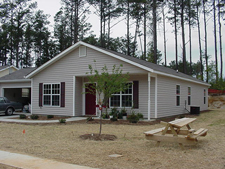
Each year, the U.S. Department of Housing and Urban Development awards entitlement funding through the Community Development Block Grant, HOME Investment Partnerships Program,and Emergency Solutions Grant.
Beginning Wednesday, May 15 through Friday, July 12, organizations can apply for a grant for Federal Fiscal Year 2025. Gwinnett County will review and accept applications through the GovGrants platform.
To apply for funding, all organizations must be registered as a user in GovGrants. View the GovGrants Subrecipient Registration User Guide to learn more.
FFY 2025 HUD Grant Application
Log into your GovGrant account to access the Fiscal Year 2025 HUD Grant Application. The following instructional guides will provide direction on how to apply for each grant opportunity:
Monday, May 20
1:00pm – 3:00pm
446 W Crogan Street, Lawrenceville, Room 108
Tuesday, May 21
1:30pm – 3:30pm
446 W Crogan Street, Lawrenceville, Room 108
Wednesday, May 22
1:30pm – 3:30pm
446 W Crogan Street, Lawrenceville, Room 106
Gwinnett County made available funds awarded through the Coronavirus Aid, Relief, and Economic Security Act (CARES Act) to nonprofit agencies providing valuable services in Gwinnett to support their response to local needs related to the COVID-19 pandemic.
Through its Round 1 application cycle (May 20 – June 4, 2020), Gwinnett County awarded more than $13.3 million in Coronavirus Relief Funds to 104 nonprofit and faith-based agencies.
Through its Round 2 application cycle (August 10 – 28, 2020), Gwinnett County awarded more than $10.5 million in Coronavirus Relief Funds to 82 nonprofit and faith-based agencies.
Through its Round 3 application cycle (February 1 – 19, 2021), Gwinnett County awarded more than $12.2 million in grants received from the U.S. Department of Housing and Urban Development (HUD) to 47 nonprofit and faith-based agencies.

Funds may be used to construct, reconstruct, and rehabilitate single-family and multi-family housing. Down payment assistance is also available to qualifying low- and moderate-income first-time homebuyers.
Formerly the Emergency Shelter Grant, the ESG Program was created through the passage of the McKinney-Vento Homeless Assistance Act of 1987. ESG funds must be used to provide shelter and supportive services to homeless persons or to provide homelessness prevention activities for low- and moderate-income persons who are in danger of becoming homeless. Public agencies or nonprofit organizations currently providing services for individuals/families in Gwinnett County who are homeless or at risk of becoming homeless, or have a recent history (within the last five years) of providing similar services are encouraged to apply for ESG funding.
Gwinnett County prepares a new Consolidated Plan every five years that identifies housing, community development, and homeless needs. The plan also establishes measurable goals, priority objectives and strategies to address these identified needs, and contains the County’s proposed investments of HUD Grant funds to address these needs. Funding awarded to Gwinnett County by HUD is utilized to carry out the activities needed to meet the annual goals, objectives, and performance measures proposed in the Consolidated Plan. The current five-year Consolidated Plan and the most recent Annual Action Plans are available for download.
Each year HUD requires that Gwinnett County submit a report on its grant performance and accomplishments through the preparation and submission of the Consolidated Annual Performance and Evaluation Report. The CAPER contains narratives, tables, and location maps for the activities carried out that year, and reports on the County's progress in addressing the goals, objectives, and performance measures established in the five-year Consolidated Plan and in that year's Annual Action Plan.
The CAPER is made available for public review and comment for a 15-day period prior to submission to HUD. At least one public hearing is held by the County during the 15-day public comment period. The CAPER contains all public comments received during the program year on which the CAPER is reporting.
Click to download these items: